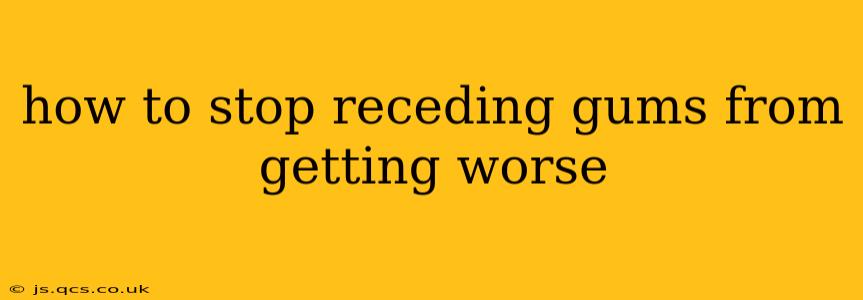Receding gums, also known as gingival recession, is a common dental problem that exposes the roots of your teeth. It can lead to sensitivity, tooth loss, and other oral health issues. While some recession is a natural part of aging, aggressive brushing, gum disease (periodontitis), and genetics can significantly accelerate the process. The good news is that you can take steps to slow or even stop further gum recession. This comprehensive guide will explore effective strategies to protect your gums and maintain a healthy smile.
What Causes Receding Gums?
Understanding the underlying causes of receding gums is crucial to effective treatment and prevention. Several factors contribute to this condition:
- Aggressive Brushing: Brushing too hard with a hard-bristled toothbrush can wear away the gum tissue over time.
- Gum Disease (Periodontitis): This is a major culprit. Bacteria build up, causing inflammation and infection that damages the supporting structures of the teeth, leading to gum recession.
- Genetics: Some people are genetically predisposed to gum recession, regardless of their oral hygiene habits.
- Teeth Grinding (Bruxism): Constant grinding or clenching puts excessive pressure on the gums and teeth, potentially causing recession.
- Smoking: Smoking significantly increases the risk of gum disease, which in turn accelerates gum recession.
- Hormonal Changes: Fluctuations in hormone levels, especially during pregnancy or menopause, can sometimes increase gum sensitivity and susceptibility to recession.
- Improper Flossing: Incorrect flossing techniques can also damage gum tissue.
How Can I Prevent Further Gum Recession?
Prevention is key when it comes to gum recession. By adopting these practices, you can significantly reduce the risk of further damage:
- Gentle Brushing Technique: Use a soft-bristled toothbrush and brush gently using short, back-and-forth strokes. Avoid scrubbing aggressively.
- Proper Flossing: Learn the correct flossing technique to clean between teeth effectively without damaging your gums. Consider using interdental brushes if flossing is difficult.
- Regular Dental Checkups: Schedule regular visits with your dentist for professional cleanings and examinations. Early detection and treatment of gum disease are crucial.
- Quit Smoking: Smoking severely compromises oral health, increasing the risk of gum disease and recession. Quitting is a significant step towards better gum health.
- Stress Management: Chronic stress can negatively impact your overall health, including your oral health. Practice stress-reducing techniques like yoga or meditation.
- Mouthwash: Using an antimicrobial mouthwash can help control plaque and bacteria, contributing to healthier gums. Always consult your dentist before using any mouthwash.
What Treatments Are Available for Receding Gums?
If you already have receding gums, several treatments can help:
- Scaling and Root Planing: A deep cleaning procedure to remove plaque and tartar from below the gum line.
- Gum Grafting: A surgical procedure where gum tissue from another part of your mouth (or a donor) is grafted onto the receding areas.
- Guided Tissue Regeneration (GTR): This procedure uses a special membrane to promote the regrowth of gum tissue and bone.
- Enamel Matrix Derivative (EMD): A protein gel that helps stimulate the regeneration of gum tissue and bone.
Can Receding Gums Be Reversed?
While complete reversal of severe gum recession may not always be possible, preventing further recession and improving gum health is definitely achievable. Early intervention is key. The treatments mentioned above can help restore some lost gum tissue and improve the overall health of your gums.
Does Receding Gumline Mean Gum Disease?
Receding gums are often a symptom of gum disease (periodontitis), but not always. While periodontal disease is a major cause, other factors, as mentioned earlier, can also contribute to gum recession. It's important to see a dentist for a proper diagnosis to determine the underlying cause of your receding gums.
How Do I Know If My Gums Are Receding?
Several signs indicate receding gums:
- Longer-appearing teeth: Your teeth appear longer than before.
- Exposed tooth roots: The roots of your teeth become visible.
- Sensitive teeth: You experience increased sensitivity to hot, cold, sweet, or sour foods and drinks.
- Loose teeth: In advanced cases, teeth may become loose due to bone loss.
- Red, swollen, or bleeding gums: These are often signs of gum inflammation (gingivitis), which can progress to periodontitis.
What Home Remedies Can Help Receding Gums?
While home remedies may offer some temporary relief and support healthy gums, they are not a substitute for professional dental care. Some options include rinsing with salt water or using aloe vera gel, but these should be used in conjunction with proper oral hygiene and dental checkups.
By understanding the causes of receding gums and proactively implementing preventative measures and seeking professional dental care when needed, you can effectively manage and potentially stop further gum recession, preserving your oral health and a beautiful smile for years to come. Remember, early intervention is crucial, so don't hesitate to schedule an appointment with your dentist if you have any concerns about your gum health.
